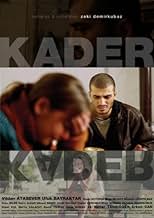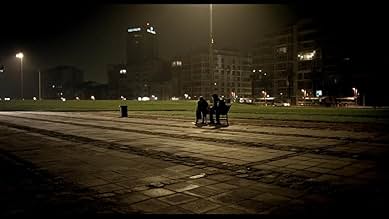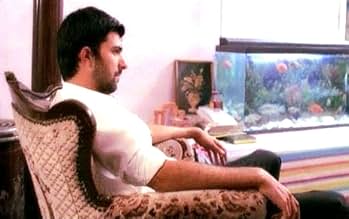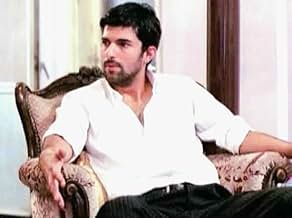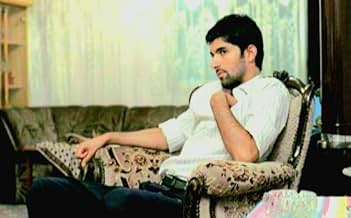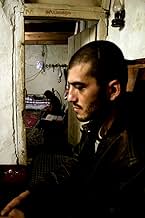Kader
- 2006
- 1h 43m
ÉVALUATION IMDb
7,7/10
19 k
MA NOTE
Ajouter une intrigue dans votre langueBekir loves Ugur, who loves Zagor, who is about to get out of jail. An already tense love triangle is thrown into turmoil on a hot summer night, when Zagor kills someone, and Ugur disappears... Tout lireBekir loves Ugur, who loves Zagor, who is about to get out of jail. An already tense love triangle is thrown into turmoil on a hot summer night, when Zagor kills someone, and Ugur disappears.Bekir loves Ugur, who loves Zagor, who is about to get out of jail. An already tense love triangle is thrown into turmoil on a hot summer night, when Zagor kills someone, and Ugur disappears.
- Prix
- 10 victoires et 9 nominations au total
Apo Demirkubuz
- Muzo
- (as Abdullah Demirkubuz)
Avis en vedette
We don't get Turkish films in Australia, apart from the odd festival piece. We have to wait for the DVDs to arrive or to be sent by relatives. I have just seen Kader.
How interesting it is that characters and reviewers alike talk about Bekir's love for Ugur. In every culture, there is a degree of confusion where love ends and obsession begins, but in my experience it has always been a particular Mediterrenean/Balkan disease. The director, very skillfully, conveys that in an environment where all conviction is hopeless dedicating a life to a person makes as much sense as any other formula for living. Bekir's obsession for Ugur intensifies because of, not despite, her rejection of him. However, the film is much more than a doomed love story. It is at once an exploration of alienation of youth, a study of roots of violence and a critique of machismo culture. Bekir's character reminded me a line from a well-known Turkish poem: "Like a pain without a body / seeking an organ to attach itself" (my translation, my apologies to purists). In reality, the line applies to all the major characters in the film. Much criticised ending is perfect, in my opinion. I cannot imagine a better way to end this important addition to modern Turkish cinema.
How interesting it is that characters and reviewers alike talk about Bekir's love for Ugur. In every culture, there is a degree of confusion where love ends and obsession begins, but in my experience it has always been a particular Mediterrenean/Balkan disease. The director, very skillfully, conveys that in an environment where all conviction is hopeless dedicating a life to a person makes as much sense as any other formula for living. Bekir's obsession for Ugur intensifies because of, not despite, her rejection of him. However, the film is much more than a doomed love story. It is at once an exploration of alienation of youth, a study of roots of violence and a critique of machismo culture. Bekir's character reminded me a line from a well-known Turkish poem: "Like a pain without a body / seeking an organ to attach itself" (my translation, my apologies to purists). In reality, the line applies to all the major characters in the film. Much criticised ending is perfect, in my opinion. I cannot imagine a better way to end this important addition to modern Turkish cinema.
Conceived as a prequel to MASUMİYET (1997), KADER (DESTINY) focuses on an impossible love-affair between Bekir (Ufuk Bayraktar) and Uğur (Vildan Atasever) that begins in the seedier areas of Beyoğlu in İstanbul and remains unfinished in the snowy wastes of Kars in the east of the Republic of Turkey.
The sentiments expressed are redolent of the Yeşilçam melodramas that hitherto have formed a backdrop to many of Demirkubuz's movies. Bekir leaves his wife Emine (Güzin Alkan) and children on at least two occasions to pursue Uğur all around the country, despite the hopelessness of his quest. Uğur remains in love with habitual criminal Zagor (Ozan Bilen), who is transferred from prison to prison following a series of attacks on police officers, wardens and fellow inmates. Uğur keeps telling Bekir to go home, but he keeps reappearing in her life at the most inopportune moments; in the Black Sea port of Sinop, for example, she is evicted from her hotel room as Bekir clamors to see her. The ill-matched couple finally fetch up at a mud-brick house in Kars; nothing is resolved (which subverts the Yeşilçam convention).
Demirkubuz invests this story with gritty social realism. Uğur grows up in a violent environment where women are routinely treated as sex-objects with little power of self-determination. She cannot quite grasp the fact that Bekir lacks the outward strength to conform to her expectations of all men. Bekir likes to exchange sex-talk with his male friends, but hardly conforms to the image of masculinity that prevails in his immediate surroundings, that is based on power and aggression. It is the kind of world where Uğur's mother's boyfriend Cevat (Engin Akyürek) is knifed to death in a kıraathane (coffee-house), simply for causing an argument.
In this kind of environment where such feelings as love and tenderness mean nothing, it's hardly surprising that the central love-affair remains unfulfilled. Bekir must shoulder some of the blame for this; at one point he vividly describes how he made love to Uğur on the first occasion they met. In truth he was almost embarrassed in her presence, unable to speak or communicate properly and falling in love with her photograph. Yet the admission of such emotions is considered "unmanly," something that Bekir is keen to avoid.
On at least three occasions the protagonists refer to destiny directing their lives: Uğur cannot help but pursue Zagor, despite his propensity for being imprisoned, while Bekir cannot avoid pursuing Uğur all round the country, even if by doing so he enters "another world," in which marriage, home and family (the traditional symbols of social and moral stability) no longer matter. We might disagree with the protagonists' analysis - to a large extent their decisions are made of their own free will - but we nonetheless understand quite tangibly how their characters have been shaped by the harsh environment in which they have grown up. This is the fundamental socio-economic point that KADER makes; if the families showed more concern for their members and their collective futures, then perhaps the world might be a less unforgiving place.
The sentiments expressed are redolent of the Yeşilçam melodramas that hitherto have formed a backdrop to many of Demirkubuz's movies. Bekir leaves his wife Emine (Güzin Alkan) and children on at least two occasions to pursue Uğur all around the country, despite the hopelessness of his quest. Uğur remains in love with habitual criminal Zagor (Ozan Bilen), who is transferred from prison to prison following a series of attacks on police officers, wardens and fellow inmates. Uğur keeps telling Bekir to go home, but he keeps reappearing in her life at the most inopportune moments; in the Black Sea port of Sinop, for example, she is evicted from her hotel room as Bekir clamors to see her. The ill-matched couple finally fetch up at a mud-brick house in Kars; nothing is resolved (which subverts the Yeşilçam convention).
Demirkubuz invests this story with gritty social realism. Uğur grows up in a violent environment where women are routinely treated as sex-objects with little power of self-determination. She cannot quite grasp the fact that Bekir lacks the outward strength to conform to her expectations of all men. Bekir likes to exchange sex-talk with his male friends, but hardly conforms to the image of masculinity that prevails in his immediate surroundings, that is based on power and aggression. It is the kind of world where Uğur's mother's boyfriend Cevat (Engin Akyürek) is knifed to death in a kıraathane (coffee-house), simply for causing an argument.
In this kind of environment where such feelings as love and tenderness mean nothing, it's hardly surprising that the central love-affair remains unfulfilled. Bekir must shoulder some of the blame for this; at one point he vividly describes how he made love to Uğur on the first occasion they met. In truth he was almost embarrassed in her presence, unable to speak or communicate properly and falling in love with her photograph. Yet the admission of such emotions is considered "unmanly," something that Bekir is keen to avoid.
On at least three occasions the protagonists refer to destiny directing their lives: Uğur cannot help but pursue Zagor, despite his propensity for being imprisoned, while Bekir cannot avoid pursuing Uğur all round the country, even if by doing so he enters "another world," in which marriage, home and family (the traditional symbols of social and moral stability) no longer matter. We might disagree with the protagonists' analysis - to a large extent their decisions are made of their own free will - but we nonetheless understand quite tangibly how their characters have been shaped by the harsh environment in which they have grown up. This is the fundamental socio-economic point that KADER makes; if the families showed more concern for their members and their collective futures, then perhaps the world might be a less unforgiving place.
Zeki Demirkubuz has his personal cinema aspect as the other legends and this view makes this movie the unique movie in the History of Turkish Cinema.
The leading role is the most important role in this movie because of his ability of show how normal Turkish guys love.
Also the movie show us how can a man ruin his and his family's life. The issue looks like ordinary,simple and routine but the director shows how important issue it is. Camera views , sound , dialogs are great Zeki Demirkubuz will be a legend in a few years. Original, different, extraordinary, must see..
The leading role is the most important role in this movie because of his ability of show how normal Turkish guys love.
Also the movie show us how can a man ruin his and his family's life. The issue looks like ordinary,simple and routine but the director shows how important issue it is. Camera views , sound , dialogs are great Zeki Demirkubuz will be a legend in a few years. Original, different, extraordinary, must see..
Imagine a film, that makes you feel the hardness of the pavement you hit your head onto, once again. Imagine a film, the only thing you can do after leaving the cinema is shutting up your mouth. Imagine a film, that tells you the inside world of the taxi driver who is driving you home or to work.
This is thematic continuation of Masumiyet, but more in the flashback mode and hits much powerful than Masumiyet, although with a less experienced cast. The story tells us how the love of Bekir and Ugur (continued characters in Masumiyet) began, and the surroundings of them in their youth. But ! this is the apparent, the easily visible part of that film! The more important thematic gem, is the surroundings of these two characters, which appropriately fits the living-cultural-social conditions of the big populated suburbs of big cities of Turkey. This is not a documentary and not a love story with its simplest meaning and it is not realism; it is the reality itself. It's bone hard, that pulls you into the living of the 'damned', as termed by the bourgeois or religious jargon. The acting is, though Vildan Atasever got so much negative critics (my opinion, she is the leading cast, a very talented artist) superb. Keep also in mind that certain camera angels in very small locations are used masterfully. The story: do not look to the apparent love story going on ! Try to understand those circumstances and those people. People live the lives of conditions they are born into. It is a everyday news here in Turkey, that some people kill some other for not any reason that could be put into the borders of "western rationality". The best explaining word for this movie is a German word: Knallhart ! (not implying the film knallhart-2006 in any way) translated as tough enough, but which explains a more dramatic condition. That film is a real Knallhart of the last few years not only in the name of Turkish movie making. You can observe these lives in Barcelona, Rome, Berlin, and maybe all Latin America. For those watching this film with translation, either dubbed or subbed, many of the dialogs, i guess, will be more softly pronounced. Linguistic is the heart of a culture. And, Demirkubuz made his masterpiece by pulling out the heart of the streets of its shell and bringing it to the world of cinema. There is a world going on with very simple rules, when you are asleep.
and finally some trivial: Demirkubuz's 2001 movie Yazgi means also destiny or fate.
This is thematic continuation of Masumiyet, but more in the flashback mode and hits much powerful than Masumiyet, although with a less experienced cast. The story tells us how the love of Bekir and Ugur (continued characters in Masumiyet) began, and the surroundings of them in their youth. But ! this is the apparent, the easily visible part of that film! The more important thematic gem, is the surroundings of these two characters, which appropriately fits the living-cultural-social conditions of the big populated suburbs of big cities of Turkey. This is not a documentary and not a love story with its simplest meaning and it is not realism; it is the reality itself. It's bone hard, that pulls you into the living of the 'damned', as termed by the bourgeois or religious jargon. The acting is, though Vildan Atasever got so much negative critics (my opinion, she is the leading cast, a very talented artist) superb. Keep also in mind that certain camera angels in very small locations are used masterfully. The story: do not look to the apparent love story going on ! Try to understand those circumstances and those people. People live the lives of conditions they are born into. It is a everyday news here in Turkey, that some people kill some other for not any reason that could be put into the borders of "western rationality". The best explaining word for this movie is a German word: Knallhart ! (not implying the film knallhart-2006 in any way) translated as tough enough, but which explains a more dramatic condition. That film is a real Knallhart of the last few years not only in the name of Turkish movie making. You can observe these lives in Barcelona, Rome, Berlin, and maybe all Latin America. For those watching this film with translation, either dubbed or subbed, many of the dialogs, i guess, will be more softly pronounced. Linguistic is the heart of a culture. And, Demirkubuz made his masterpiece by pulling out the heart of the streets of its shell and bringing it to the world of cinema. There is a world going on with very simple rules, when you are asleep.
and finally some trivial: Demirkubuz's 2001 movie Yazgi means also destiny or fate.
If movie art would be mentioned as a football game, i would assume Demirkubuz as Johan Cruyff. I think Kader is the best example of the simple and fascinating character of Turkish Movie. Simplicity is the key word not only of Demirkubuz and Cruyff, but also of being expressive directly in movie art.
In the final part of film, the speech of Bekir is like the bullet of the speech of Frank (Denis Hopper) of Blue Velvet, it had its place in deepest part of my heart.
If we should make a choose of a masterpiece, Kader is the first candidate with its original and impressive language.
In the final part of film, the speech of Bekir is like the bullet of the speech of Frank (Denis Hopper) of Blue Velvet, it had its place in deepest part of my heart.
If we should make a choose of a masterpiece, Kader is the first candidate with its original and impressive language.
Le saviez-vous
- AnecdotesIn the first scene of Irfan's hotel, Bekir salutes Irfan and they watch Masumiyet (1997) on TV, which is sequel of this movie. In a way, Bekir witnesses his future with Ugur.
- GaffesWhile Bekir is cutting Ugur's photo the tea glass is nearly empty, but then he looks in the photo he cut and half of the glass is full.
- ConnexionsFollows Masumiyet (1997)
- Bandes originalesMeditations
Written and performed by Eduard Artemyev
Courtesy of Electroshock Records
Cleared by Rh Pozitif Publishing
Meilleurs choix
Connectez-vous pour évaluer et surveiller les recommandations personnalisées
- How long is Destiny?Propulsé par Alexa
Détails
Box-office
- Brut – à l'échelle mondiale
- 122 904 $ US
- Durée1 heure 43 minutes
- Couleur
- Mixage
Contribuer à cette page
Suggérer une modification ou ajouter du contenu manquant


